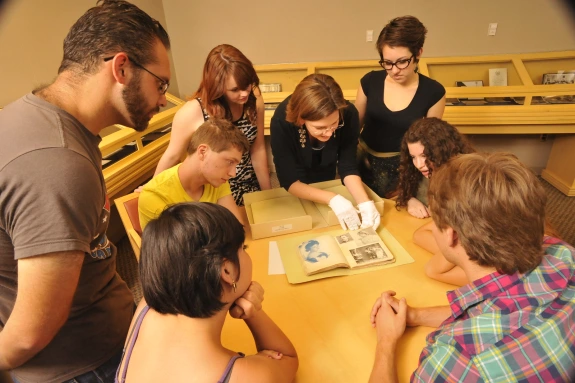
Areas of Research
The School of Anthropology is home to a diverse community of anthropologists who study all aspects of human life, from our hominid origins millions of years ago to the vast diversity of populations living in the world today. Our anthropologists ask questions about all components of the human experience, and seek to describe and interpret human behavior and culture, language, biology, and the environment at many levels of organization – from molecules to ecosystems.
Our School is one of the few institutions to fully support the integrated sub-discipline approach to Anthropology, with research embracing Archaeology, Biological Anthropology, Linguistic Anthropology, and Sociocultural Anthropology (including Applied Anthropology).
Archaeology
Archaeology is the systematic study of human behavior and society using material culture and environmental data.
Archaeologists at the University of Arizona’s School of Anthropology work on a range of topics from the earliest humans to complex societies to issues in archaeological heritage. The archaeological sub-faculty conduct fieldwork across the globe.
In addition to our main track in anthropological archaeology, graduate students can specialize in:
- Applied Archaeology
- Ecological & Environmental Anthropology
- Mediterranean Archaeology
- Southwest Land, Culture, & Society
Biological Anthropology
Biological Anthropology weaves together a diverse multi-disciplinary approach to understand the biological evolution of humans and our closest relatives.
Our program integrates individual, population, and species level data to examine the evolution and biology of humans and other primates. We achieve this through studying behavior, cognition, physiology, and genetics, throughout development and the entire lifespan. We are also dedicated to understanding the relationships between sociality and health to inform modern human conditions.
Find Faculty in Biological Anthropology
Linguistic Anthropology
Linguistic anthropology is the study of language as a social and cultural practice.
In this area of study, we provide students with the theoretical tools needed to understand language in its larger sociopolitical context. Our current faculty specialize in the study of migration, border studies, citizenship, sociopolitical transformation, globalization, consumption, and mass media. Our program emphasizes the analysis of language structure, including both qualitative and quantitative approaches. We offer methodological training in the areas of ethnographic discourse analysis, face-to-face interactional analysis, quantitative variationist analysis, and video ethnography.
The linguistic anthropology faculty are engaged in the following areas of research:
- Youth Language and Culture
- Race, Gender, Class and Language
- Language Ideologies
- Sociophonetics
- Sociolinguistic Variation
Find Faculty in Linguistic Anthropology
Sociocultural Anthropology
Sociocultural anthropology combines theoretical and methodological innovation with a strong commitment to fieldwork and to ethnographic writing.
The sociocultural faculty has exceptionally broad interests, ranging from historical colonialism to contemporary forms of globalization; from population history to current immigration in the Americas; from race and ethnicity to nationalism; from legal anthropology to human rights. Faculty members conduct research in North America – including the US-Mexico borderlands – as well as in Latin America, South and Southeast Asia, the Middle East and Africa.
Socio-cultural faculty interests in global health disparities, religion, violence, performance, social memory, materiality, evolution, complexity, political ecology, health, and language resonate with those of the School's archaeological, biological, linguistic and applied anthropologists.
These crosscutting interests are reflected in our Interdisciplinary Research Foci:
- Ecological & Evolutionary Anthropology
- Historical Anthropology & Social Memory
- Medical Anthropology
- Southwest Land, Culture & Society
These concentrations foster integration and innovative synergies across the sub-fields of Anthropology and can be incorporated as part of the socio-cultural major or as a separate minor.
Find Faculty in Sociocultural Anthropology
Bureau of Applied Research in Anthropology (BARA)
The Bureau of Applied Research in Anthropology (BARA) is a unique academic research unit within the School of Anthropology at the University of Arizona.
BARA's mission is to place anthropology at the service of contemporary society, prepare the next generation of professional anthropologists, advance knowledge of the human condition, and address the pressing issues of local communities.
BARA faculty and affiliates carry out research, teaching, and outreach activities within Arizona, throughout the country, and internationally.

